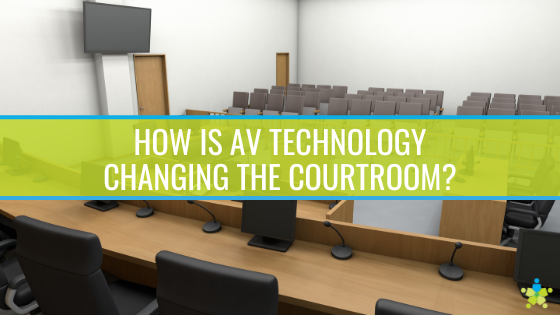[vc_row][vc_column][vc_column_text]
New Horizons, New Landscapes.
While AV technology is not necessarily new, the increased demand for it is, and this demand even reaches into the modern courtroom. With the pandemic, the need to continue trying cases didn’t lessen, which paved the way for AV technology to fill in the gaps, effectively keeping the docket moving while also keeping people safe.[/vc_column_text][vc_column_text]How is AV Technology changing the Landscape in the Courtroom?
This new landscape is presenting many benefits and could change how the justice system works in the future. The benefits include increased efficiency, flexibility, accessibility, and solutions to keep cases on track.[/vc_column_text][vc_column_text css=".vc_custom_1629840486833{padding-right: 50px !important;padding-left: 50px !important;}"]Efficiency
Efficiency is the biggest change that is brought about in this new landscape. Scheduling with court proceedings can be pretty tight, and if one person was not available or one item of evidence could not be delivered, this could delay proceedings from continuing. This occurrence can also sway how the proceedings go, as evidence and witnesses that aren’t able to be shown or cross examined cannot be considered. However, AV cameras and conferencing technology can be utilized to keep proceedings on schedule.[/vc_column_text][vc_column_text css=".vc_custom_1629840560470{padding-right: 50px !important;padding-left: 50px !important;}"]Accessibility
Accessibility goes beyond wheelchair access, braille, and any of the other tools in place to facilitate movement for in-person proceedings. Working with a reputable AV integrator with access to a variety of video conferencing technologies opens up the possibility of having remote witnesses and expert testimony from those who may not otherwise be able to appear.[/vc_column_text][vc_column_text css=".vc_custom_1629840589839{padding-right: 50px !important;padding-left: 50px !important;}"]Solutions
A solution to a lot of unforeseen problems, AV integration can add a level of convenience that was not there before. Not only in the sense of being able to connect and communicate at a distance, but also allowing the chance to record the proceedings. Collecting court recordings can be useful to refer back to the trial for either historical record, fact-checking, or as a lesson for new law students. AV technology can also provide a solution for presenting evidence in a way that everyone can see clearly.[/vc_column_text][/vc_column][/vc_row][vc_row][vc_column][vc_column_text]What products could be seen in a courtroom and why would they be useful?
The four main products that would be useful in a courtroom would be audiovisual conferencing equipment, displays, a control system, and document cameras. A well-equipped courtroom would have these items available for optimum success. Here are some examples of this technology at work in the courtroom:- Audio visual conferencing offers much in the way of communication and connection. This technology can link more than two people together to offer long-distance conversation or proceedings to take place. Audio-video conferencing can add many levels to a call by including the ability to use a whiteboard, share content, and share documents during a presentation. This can be particularly useful to any lawyer arguing a case.
- Displays are integral to the visual aspect of video conferencing. There is a vast array of displays to choose from, and a courtroom can go from simple to impressive depending on what type of display is utilized. High-quality, high-resolution displays are ideal for making sure every image is as crystal clear as possible.
- Document cameras are a crucial piece of technology to include in the design of a modern courtroom. These cameras offer a very detailed close-up look at any items that need to be shown. In a courtroom, these can be extremely useful in showing evidence to a room of jurors. It sometimes takes only one piece of evidence to sway a jury, so it is important for the documents presented to be clear.
- Control systems can tie it all together. Control systems are extremely flexible and can make the entire system easy to manage by linking it all to one, unified place. They are integral for maximum usability.



